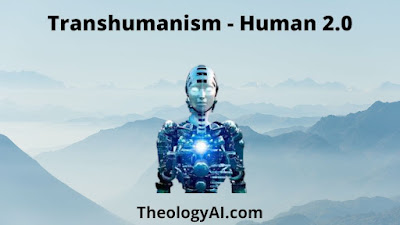Transhumanism is the belief or theory that the human race can evolve beyond its current physical and mental limitations, especially by utilizing science and technology. At times it is also referred to as Human 2.0. There is a viewpoint that humans can change or upgrade them to be cyborgs- part human and part machine.
The topic of posthumanism and transhumanism are important in AI discussions. Scott A. Midson discusses this topic and states that,
"Closer analysis of the teleology of transhumanism, however,
reveals a concrete vision of the movement that can be regarded as slightly yet
significantly different to the undergirding substantive interpretation of the
human. While this foundational assumption of human nature can be used to link
Christianity, humanism and transhumanism, the transhumanist vision of the
future reveals a more nuanced understanding of the human that may compete with
the Christian eschatological vision."[1]
"Many transhumanists wish to follow life paths which
would, sooner or later, require growing into posthuman persons: they yearn to
reach intellectual heights as far above any current human genius as humans are
above other primates; resistant to disease and impervious to aging; to
have unlimited youth and vigor; to exercise control over their own desires,
moods, and mental states; to be able to avoid feeling tired, hateful, or
irritated about petty things; to have an increased capacity for pleasure, love,
artistic appreciation, and serenity; to experience novel states of
consciousness that current human brains cannot access."[2]
The ultimate goal of transhumanists is to use technology to bring a primarily humancentric utopia in which humans are fundamentally changed and may not be regarded as humans in the sense it is understood today. Transhumanists are looking to change or alter humans to become posthuman. One of its goals is to find more meaning and happiness in life. The questions like where we came from, how did we reach here, where we are going, and how we reach our destination are all relevant in this discussion. Religious beliefs and other systems answer these questions in different ways. Christianity points it to a creator God who created humans in His image with a purpose.
We live in an age of upgrades. Most of the things we own now need frequent upgrades. An upgrade is a standard way of life. Many people cannot live with outdated stuff based on what the companies sell them. In some cases, I feel the innovation has reached a point where these companies are struggling to give a compelling reason to upgrade except by adding something which is not that essential or valuable for the ordinary person. The same logic is now applied to humans in the sense that augmented humans can be upgraded to overcome some of the limits currently experienced.
Many things can be written and discussed on this topic, starting with the origin and meaning of life. I hope this small introduction to this topic will trigger some interest in thinking and addressing this issue in the realms where you have an opportunity. Transhumanists and Christians view humans in different ways. Transhumanists depending upon the advancements already made in technology, hope to reach a point where we will see the next version of humans. Christianity teaches that a human's final destiny is not to become a cyborg but to spend eternity with their creator. These two views stand in contrast to each other. My research has shown that many people have volunteered to be part of any trials to become human 2.0. It also reflects the trend of our culture to some extent and will continue. We have to be ready to address this issue.
As I have written, we are augmented by technology, and we have the power of Google to search and find anything. Transhumanism takes it to another level to alter what it means to be a human.
[1] Scott
A Midson, Cyborg Theology: Humans, Technology and God (London: I.B.
Tauris, 2018), 76.
[2] “See the official Transhumanist website for a deeper explanation of the posthuman at
humanityplus.org under faqs”




.png)
No comments:
Post a Comment